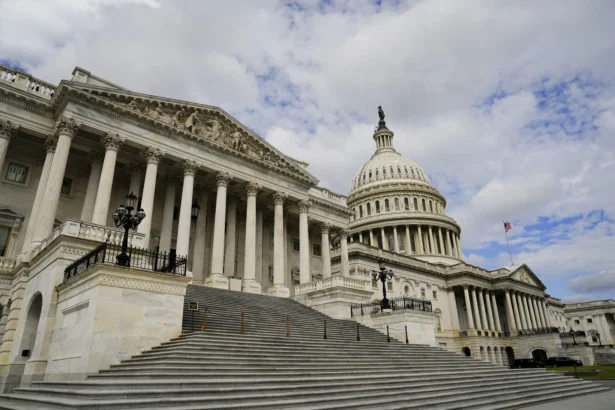House Speaker Kevin McCarthy (R-Calif.) reached a point of frustration on Sept. 21 after Republicans failed—for the second time—to pass a procedural vote to allow debate on the 2024 defense appropriations bill.
The failed vote capped a string of setbacks for Mr. McCarthy in trying to avert a government shutdown, which will be triggered when the fiscal year ends on Sept. 30 if Congress does not take action to ensure ongoing funding.
The usually unflappable speaker voiced irritation with a handful of hardline Republican members who have blocked legislation proposed by their own party this week.
“It’s frustrating in the sense that I don’t understand why anybody votes against bringing the idea and having the debate. And then you got all the amendments if you don’t like the bill,” Mr. McCarthy told reporters on Sept. 21.
“This is a whole new concept of individuals that just want to burn the whole place down. It doesn’t work.”
The speaker later canceled House floor votes scheduled for Sept. 22, dismissing members a day early for a long weekend. No votes are scheduled on Monday, Sept. 25, due to the Yom Kippur holiday.
McCarthy’s Tough Week
Mr. McCarthy’s tough stretch began on Sept. 13 when he canceled the procedural vote that would have allowed consideration of the $886 billion defense bill amid opposition from hardliners.
As the calendar moved closer to the end of the fiscal year with no appropriations endgame in sight, a coalition of House Republicans hammered out a continuing resolution that would keep the federal government funded through Oct. 31, buying more time to complete the funding process.
The measure included an 8 percent reduction in discretionary spending and increased border security measures popular with Republicans.
The measure, proposed by some members of the far-right House Freedom Caucus and the pragmatically minded Main Street Caucus, was introduced on Sept. 17 with the aim of creating a GOP win while avoiding a shutdown, something most GOP House members are eager to avoid.
A Capitol Hill staffer told The Epoch Times that mainstream Republicans do not want to be blamed for a potential shutdown, which would force members of the armed services to go without pay, among other things.
“Nobody wins in a government shutdown,” Mr. McCarthy told reporters on Sept. 15.

However, the continuing resolution was opposed by hardline Republicans who objected to any extension of President Joe Biden’s funding priorities and agitated for even deeper spending cuts to be enacted for the full fiscal year. On Sept. 19, Mr. McCarthy canceled a procedural vote on the matter, delaying consideration indefinitely.
The dogged speaker then rescheduled the procedural vote on the defense appropriations bill, perhaps hoping to generate some progress in passing regular appropriations bills before the deadline.
That vote failed on Sept. 19, with five Republicans voting against even allowing debate on the bill, a nearly unheard-of protest against their own party’s leadership.
Undeterred, Mr. McCarthy called a closed-door caucus session on Sept. 20 to attempt a solution. Several members said the meeting produced progress in addressing members’ concerns. Others were less optimistic.
“We made a lot of progress on it,” Rep. Ralph Norman (R-N.C.) told The Epoch Times. Mr. Norman had voted against consideration of the defense bill.
“I agreed to vote for the rule for DOD [Department of Defense]. I agreed to vote for the rule on [the] floor when it comes to the final vote,” he said.
However, Rep. Marjorie Taylor Greene (R-Ga.) said the Republican caucus was far from agreement. “We still don’t have an agreement on a [continuing resolution]. We still don’t have the number of votes to get it,” she said.
“We’re only buying 30 days, and we have 11 [more] appropriations bills. I’ll fight for a plan that will work. I haven’t seen one yet.”
The following day, Sept. 21, Mr. McCarthy brought the defense bill up for a second procedural vote. It failed a second time, with six Republicans opposed.
Plan B
As late as this week, Mr. McCarthy has insisted that there was still plenty of time to either pass a continuing resolution or complete the appropriations process. However, he did voice concern about being “jammed by the Senate” if the process dragged on too long.
That fear may now be realized.
The Senate has been working on its own version of appropriations bills in a bipartisan fashion. Now, with the House seemingly unable to generate momentum, Senate leaders have an opportunity to craft a continuing resolution that would likely be even more distasteful to hardline House Republicans.
If that were to happen next week, Mr. McCarthy would have to choose between calling for a vote on a bill that many, perhaps most, of his members dislike, and being blamed for a government shutdown.
The speaker appeared undeterred, if somewhat irritated, by the most recent failed vote.
“I know it’s an obstacle, but I find it as a challenge, and we’re going to solve it,” he told reporters.
Mr. McCarthy has consistently pointed out that it takes time for members to come to an agreement and that negotiations are part of the process.
Congress has completed all 12 appropriations bills by Sept. 30 only four times in the last 46 years, the last time in 1997.
In other years, Congress resorted to continuing resolutions to extend the deadline on omnibus spending bills, which lump all spending into a single yes-or-no package. In 2022, Congress used both tactics, passing a $1.7 trillion spending bill in late December, an event hardline Republicans are determined not to repeat.
Though business on the House floor was suspended, the Rules Committee was scheduled to meet on Sept. 22 to set the terms for debate on appropriations bills for the departments of Homeland Security, State, Defense, and Agriculture.
When Congress resumes regular business on Sept. 26, the House and Senate will have five calendar days to pass a continuing resolution, come to an agreement on 12 appropriations bills, or allow the government to shut down.
From The Epoch Times

